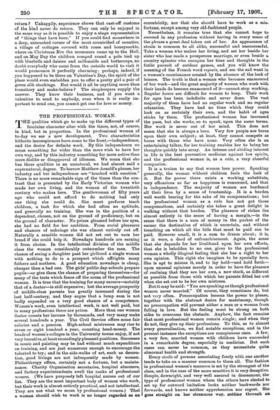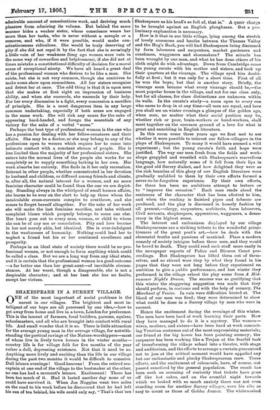THE PROFESSIONAL WOMAN.
THE qualities which go to make up the different types of feminine character alter with the times, not, of course, in kind, but in proportion. In the professional woman of to-day we see a new development. Two characteristics hitherto inconspicuous have come to the front,—independence, and the desire for definite work. By this independence we mean something far wider than the mere wish to have her own way, and by this industry something far more active than mere dislike or disapproval of idleness. We mean that she has these qualities in an unnatural, we had almost said a supernatural, degree. To borrow Matthew Arnold's phrase, her industry and her independence are "touched with emotion." There is no more remarkable sign of the times than the con- trast that is presented by the Early Victorian woman who made her own living, and the woman of the twentieth century who makes hers. The gentlewoman of fifty years ago who could not afford to do nothing had only one thing she could do. She must perforce teach children, a task for which she had often no aptitude, and generally no training. She was in the position of a dependent, chosen, not on the ground of proficiency, but on the ground of character. No prizes gleamed before her eyes, she had no field for her ambition. From social pleasures and chances of rairriage she was almost entirely cut off. Naturally a sensible woman did not set out to earn her bread if she could help it. Nowadays hundreds are earning it from choice. In the intellectual division of the middle class the women considerably outnumber the men. The chance of seeing a daughter past her girlhood a single woman with nothing to do is a prospect which affrights many fathers and mothers. A good education nowadays is cheap, cheaper than a bad one. The girls' public day-schools prepare pupils—or give them the chance of preparing themselves—for many of the tests which fence off the arena of the professional woman. It is true that the training for many careers—notably that of a doctor—is still expensive; but the average prosperity of middle-class parents has greatly increased daring the last half-century, and they • argue that a lump sum is not badly expended on a very good chance of a competence. Women's work, even intellectual work, is • not well paid, but in many professions there are prizes. More than one woman doctor counts her income by thousands, and very many make several hundreds a year. The Civil Service offers some fair salaries and a pension. High-school mistresses may rise to seven or eight hundred a year, counting head-money. The heads of women's colleges in the University towns enjoy, if not very lucrative, at least exceedingly pleasant positions. Successes in music and painting may be had without much expenditure on training, and are just numerous enough to encourage the talented to try ; and in the side-walks of art, such as decora- tion, . good livings are not infrequently made by women. Philanthropy offers, certainly not a fortune, but a mainte- nance. Charity Organisation secretaries, hospital almoners, and factory superintendents swell the ranks of professional women. (We have purposely left hospital nurses out of our list. • They are the most important body of women who work, but their work is almost entirely practical, and not intellectual. They are not what we mean by professional women.) That a woman should wish to work is no longer regarded as an eccentricity, nor that she should have to work as -a mis- fortune, except among very old-fashioned people.
Nevertheless, it remains true that she cannot hope- to succeed in any profession without having in every sense of
the phrase a great deal taken out of her. An appearance 'of strain is common to all alike, successful and unsuccessful. Take a woman who makes her living, and set her beside her sister who has made a prosperous marriage, or even beside a country spinster who occupies her time and thoughts in the futile pursuit of outdoor games, and you will know the
meaning of the French word reposes, and see the sad want in
a woman's countenance created by the absence of. the look of leisure. The truth is that a woman who becomes enamoured of her work—and the great majority of women who work with their beads do become enamoured of it—cannot stop working. Regular hours are difficult for women to keep. Their work for ages has been indefinite and never done. The vast majority of them have had no regular work and no regular relaxation. They have had no time which they could look on as certainly their own, and the habit of ages sticks by them. The professional woman has increased the pace, but she works, so to speak, upon the same terms.
Her work is never out of her mind. This does not mean that she is always a bore. Very few people are bores upon their own subject ; at least, they cannot compete as bores with those who have none. Very often she is an entertaining talker, for her training enables her to bring her thoughts quickly into array. Au intense and abiding interest in life is the best preventive medicine against low spirits, and the professional woman is, as. a rule, a very Cheerful companion.
It is a truism to say that women love power. Speaking generally, the woman without children feels the lack of it. But for power there exists a working substitute, very efficacious so far as happiness is concerned, and that is independence. The majority of women are burdened all their lives by a sense of trusteeship. It is a burden well worth bearing for the sake of its compensations ; but the professional woman as a rule has not got those compensations, and certainly she takes a great delight in walking without that burden. The pleasure of riches lies almost entirely in the sense of having a margin,—in the sense that there is a sum of money in the pocket of the earner the destination of which is uncertain, and without trenching on which all the bills that must be paid can be paid. However small, it is a sum to dream about; it is, as it were, a deed of enfranchisement. Again, the sense that she depends for her livelihood upon her own efforts, that she is beholden to no one, gives to the professional woman a wholly illogical feeling that she has a right to her own opinion. This right she imagines to be specially hers.
She is apt to misuse it, and to lay hold—and hold forth— upon unusual opinions merely in order to have the pleasure of realising that they are her own, a new stock, as different as possible from those with which her parents fitted her out when she set out to be her own mistress.
But it may be said : "You are speaking as though professional women never married." Of course, they sometimes do, but not very often. Preoccupation lessens the power to please, together with the abstract desire for matrimony, though no preoccupation will prevent either a man or a woman from falling in love. But the feeling must be strong on both
sides to overcome the obstacle. Anyhow, the fact remains that most professional women remain single ; and when they do not, they give up their professions. To this, as to almost every generalisation, we find notable exceptions, and in the present instance the exceptions are conspicuous ones. A few, a 'very few, married women with children have succeeded in a remarkable degree, especially in medicine. But such cases can never be common, as they necessitate quite abnormal health and strength.
Every circle of persons associating freely with one another tends to take on a manner common to them all. The fashion in professional women's manners is set by the strongest of the class, and in the case of the more sensitive it is very deceptive. Simple, downright, and very well assured in demeanour, the type of professional woman whom the others have elected to set up for outward imitation looks neither backwards nor
forwards, and knows neither apprehension nor regret. She goes straight on her strenuous way. getting through an
solinirable amount of conscientious work, and deriving much pleasure from admiring its volume. But behind the same manner bides a weaker sister, whose conscience wears her mom than her tasks, who is never without a scruple or a remorse, and who, if it were possible, would make con- scientiousness ridiculous. She would be truly deserving of pity.if she did not repel it by the fact that she is seemingly a little vain of her weakness (long ago women-were vain in the same way of cowardice and helplessness), if she did not at times mistake a constitutional difficulty of decision for a moral sense of exceptional nicety. We have all heard a great deal of the professional woman who desires to be like a man. She exists,- but she is not very common, though she contrives to make some show upon committees. All her sisters recognise and detest her at once. The odd thing is that it is upon men that she makes at first sight an impression of business ability, and when she succeeds, she succeeds by their help. For her every discussion is a fight, every concession a sacrifice of principle. She is a most dangerous item in any large common undertaking, especially if both sexes are engaged in the same work. She will risk any cause for the sake of appearing bard-headed, and forego the essentials of any victory for the sake of a verbal "score."
Perhaps the best type of professional woman is the one who has a passion for dealing with her fellow-creatures and their affairs. She may be a doctor, or she may belong to any of the professions open to women which require her to come into intimate contact with a constant stream of people. She is less limited than the majority of her professional sisters. She enters into the normal lives of the people she works for so completely as to supply something lacking in her own. Her work absorbs her entirely. She finds in it her only recreation. Interest in other people, whether concentrated in her devotion to husband and children, or diffused among friends and clients, is, after all, the natural interest for a woman, and no more feminine character could be found than the one we are depict- ing. Standing always in the whirlpool of small human affairs, she learns, to be ever on the alert to help up those whom the incalculable cross-currents conspire to overthrow, and she comes to forget herself altogether. For the sake of her work she will make the last feminine sacrifice, and take without complaint blame which properly belongs to some one else. Her heart goes out to every man, woman, or child to whom she can be of any use or consolation. Pity and love become in her not merely akin, but identical. She is over-indulgent • to the weaknesses of humanity. Nothing could lead her to neglect a friend but his or her continued excellence and prosperity.
Perhaps in an ideal state of society there would be no pro- fessional women, or not enough to form anything which could be called a class. But we are a long way from any ideal state, and it is certain that the professional woman is a good outcome —a far better one than her great-aunt--of inevitable circum- stances. At her worst, though a disagreeable, she is not a despicable character; and at her best she has no faults, except her virtues.











































 Previous page
Previous page